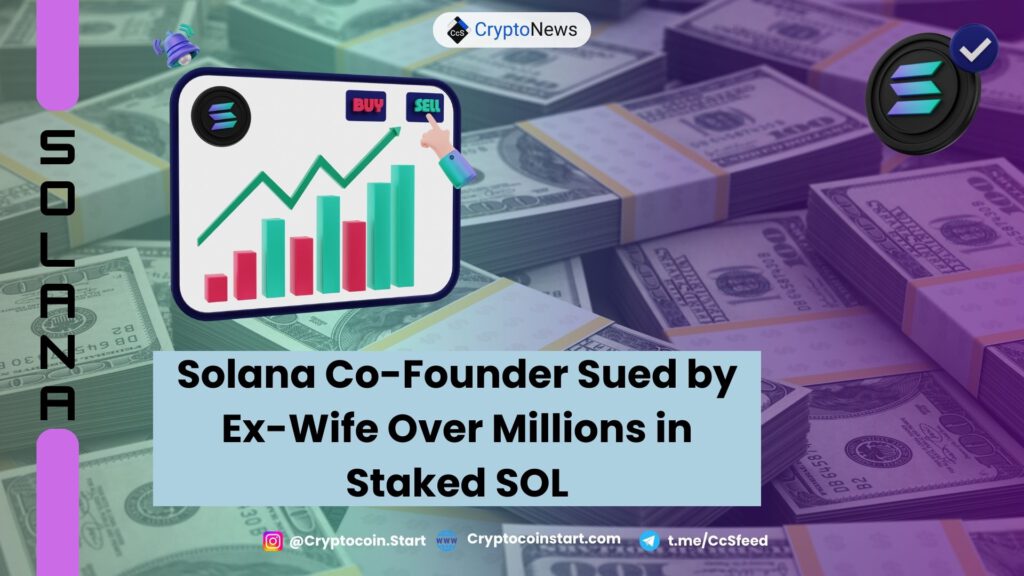
Details of the Lawsuit
The lawsuit was filed in San Francisco’s Superior Court on December 24, 2024. Elisa Rossi claims that Akridge earned “millions of dollars in staking rewards” from Solana tokens she asserts are rightfully hers, without her knowledge or consent. Rossi alleges that Akridge, who was previously Solana Labs’ principal engineer and is now the CEO of the cybersecurity company Cyber Grant, took advantage of his technical expertise in the cryptocurrency space to manipulate the situation.
According to the complaint, Akridge and Rossi had an agreement during their March 2024 divorce that divided the ownership of their Solana tokens. However, Rossi contends that Akridge kept control of the tokens, continuing to earn staking rewards without her awareness. The complaint claims that Akridge gave Rossi authority over only three accounts containing the tokens, which allowed him to secretly continue staking the tokens and earning rewards.
The Alleged Staking Scheme
Rossi’s lawsuit details that she only discovered the scheme in May 2024 when she realized that Akridge had been collecting staking rewards for months. According to her complaint, she reached out to Akridge multiple times between May and December, sending “no less than a dozen” text messages about the issue. However, Akridge reportedly dismissed her concerns and refused to return the rewards.
- Akridge allegedly laughed in Rossi’s face, saying, “good luck getting those staking rewards from me.”
- The number of SOL tokens and the sum of money involved in the case are redacted in the complaint, but it is clear that the sum exceeds $25,000.
The Impact of Solana’s Growth on the Case
Solana (SOL) has experienced significant growth, recently hitting an all-time high of $263 per token. As of now, SOL has gained over 80% in value this year, trading at around $194. The rise in Solana’s value has made staking rewards even more lucrative, further complicating the case. Solana’s role in hosting popular crypto trends, particularly memecoins, has added to the importance of this legal battle, with both parties standing to gain or lose significant amounts of money depending on the outcome.
What is Staking on Solana?
Staking is a process in which users lock up their Solana tokens to help validate transactions on the blockchain. In return, they are rewarded with additional SOL tokens. This process incentivizes users to hold and support the network, with rewards often being paid out in SOL. Given the high staking rewards, Akridge’s actions could have resulted in a substantial financial gain over the months of continued staking.
Rossi’s Attempts to Recover the Staking Rewards
Rossi’s frustration with Akridge’s refusal to return the staking rewards was highlighted in her complaint. The suit states that despite her numerous attempts to contact him, Akridge was unwilling to cooperate. His dismissive attitude toward the situation only exacerbated the dispute, leading to the lawsuit. Rossi’s legal team is now seeking to recover the rewards and address the alleged deception that took place.
Current Status of the Lawsuit
As of now, Stephen Akridge has not responded to a request for comment made through LinkedIn. Cyber Grant, the company he leads, has also been contacted for a statement. Information regarding Akridge’s legal representation was not available at the time of writing. The case is ongoing, and its outcome could have significant implications for both parties involved, particularly given the growing value of Solana tokens.
Conclusion
The lawsuit filed by Elisa Rossi against Solana co-founder Stephen Akridge highlights the complex and often murky nature of cryptocurrency ownership and staking rewards. As Solana continues to rise in value, the case could set a precedent for how such disputes are handled in the crypto space. Investors and crypto enthusiasts alike are closely watching the outcome of this high-profile legal battle.

